Fish and chips UK takeaway with biggest price rise
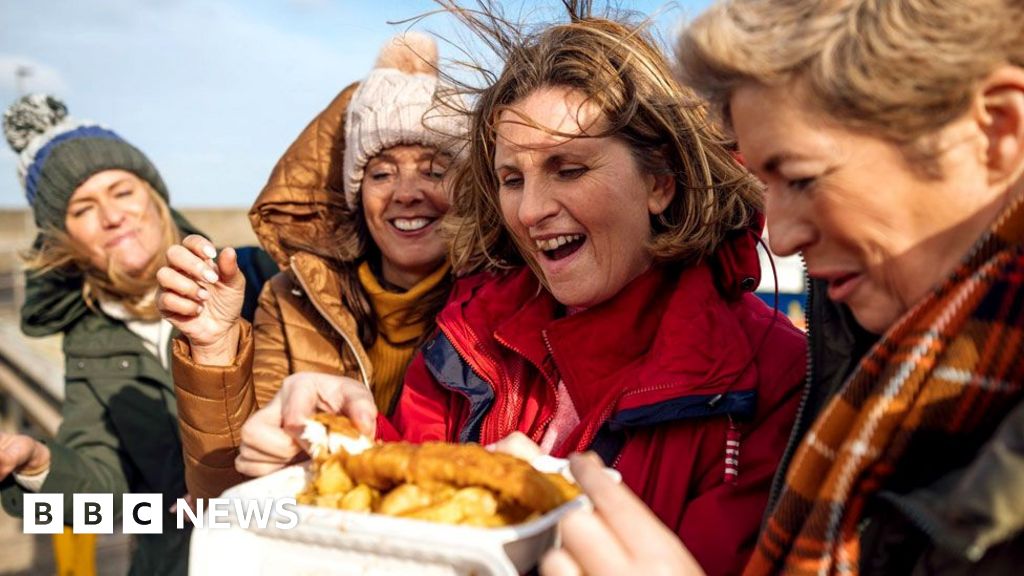
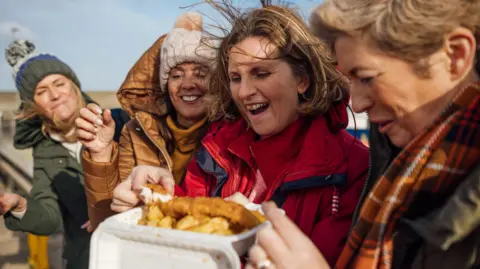 Getty Images
Getty ImagesFish and chips is a British family favourite equally enjoyed around the table on a Friday night or out of the paper on an often overcast beach.
But the deep fried delicacy has seen the biggest price increase of some of the UK’s most popular takeaways, according to new figures.
The average price for a portion of fish and chips rose more than 50% to nearly £10 in the five years to July – while the cost of a kebab went up 44% and pizza 30%.
Chip shop owners cite a “perfect storm” of costs in recent years, including soaring energy bills, tariffs on seafood imports and extreme weather hammering potato harvests.
This all means a family of four won’t get much change out of a £50 note once they’ve forked out for their tea and added some mushy peas and cans of pop.
“I’ve never known an onslaught of pressures in terms of costs going up,” said Jon Long, of Long John’s Fish and Chips in Dorset.
Jon is the third generation of his family in the trade and his daughter Emma has recently taken the helm of the business.
He added: “I’d like to think we’ll see a fifth generation but I’m not sure.”
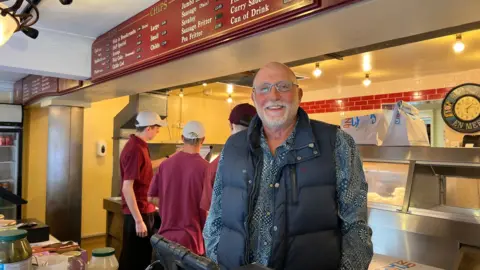 Jon Long
Jon LongFish and chips has been a staple on the menus of British families for decades, so much so that supplies of the two ingredients were protected during both world wars.
But according to Jon, a combination of increased energy and labour costs, sanctions on Russian seafood due to the invasion of Ukraine, and poor potato harvests, have forced fish and chip shops to raise their prices.
The average price of takeaway fish and chips was £9.88 in July this year, according to data from the Office for National Statistics (ONS). That was up by 52% compared with £6.48 in July 2019.
While the ONS says the figures are estimates, it suggests the cost of a fish supper has gone up more in percentage terms than that for pizza, or an Indian or Chinese main course.
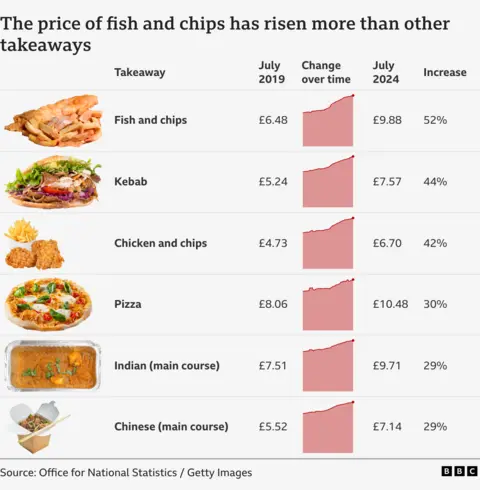
“We’ve had the perfect storm of events in terms of cost pressures,” said Jon.
“It’s not a cheap meal anymore. I think it’s still good value but it has become more expensive.”
In March 2022, the UK government announced a 35% tariff on Russian seafood imports in response to the invasion of Ukraine, at a time when food prices across the UK were rising at the fastest rate in more than a decade.
More recently, extreme weather conditions have hit potato harvests.
Cedric Porter, a potato market expert, said the rise in spud prices had been “dramatic”.
He added: “We’ve seen very high potato prices because of a small crop last year, and there’s been a small crop across the whole of Europe.”
Prices paid to UK farmers for potatoes have shot up over the last two years, according to the latest figures from the Department for Environment Food and Rural Affairs’ Agricultural Price Index (API).
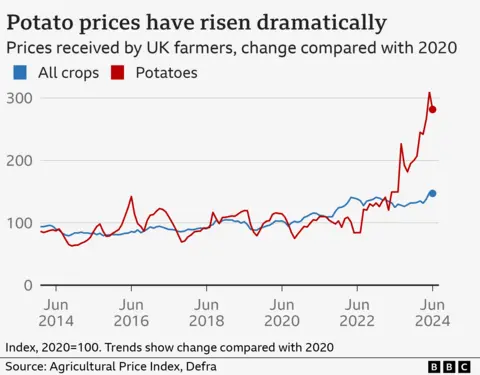
Angela Cartwright, owner of Kingfisher Fish Bar in Salford, previously told BBC Breakfast that potato prices were “extortionate”.
She said: “People think that fish and chips is a cheap meal and it just isn’t. People are prepared to pay £15-20 for a pizza but they’re not prepared to pay it for a portion of fish and chips.”
Jon said the current economic climate was the “toughest set of conditions” he had faced in his 30-plus years in the business.
“More and more pubs, hotels, chip shops, bakers and other businesses are shutting down due to crippling costs,” he said.
‘Outrageous’
For Jon, the main challenge remains his energy costs, especially standing charges, which are a daily fixed fee paid to energy suppliers for being connected to the system, regardless of how much gas or electricity a business uses.
He said the amount these charges had increased since 2021 was “outrageous”, adding that the energy regulator Ofgem had failed to protect small businesses from the increases.
A spokesperson for Ofgem said it had introduced new rules to ensure businesses get fairer treatment, more support resolving disputes, and greater transparency on fees charged by energy brokers.
They added: “We know high energy bills continue to be a challenge for many businesses. We are working closely with government and industry to understand the range of issues non-domestic customers face, and where the powers we have to tackle them could be stronger.”
The government said it was right to impose tariffs on imports of Russian fish, as well as other exports from the country.
A statement said local takeaways were “essential to thriving, vibrant communities” and support would be developed which included reforming business rates.
Related
Why investing in women is a vital next step for…
Get Nadine White's Race Report newsletter for a fresh perspective on the week's newsGet our free newsletter from The Independent's Race CorrespondentGet our fre
Business secretary signals major shift on electric car policy to…
In a determined effort to retain Nissan’s manufacturing presence in Britain, Business Secretary Jonathan Reynolds has vowed to implement “substantial c
Joint Statement: Business Secretary and Fujitsu Services Ltd
Business and Trade Secretary Jonathan Reynolds today (Friday 7 March) met chiefs for Fujitsu in Tokyo to begin talks over the cost of redress for victims of th
UK foreign secretary backs multilateral defence funding for Europe
UK foreign secretary David Lammy has said that a new multilateral fund will be needed to secure Europe’s defence as he confirmed that Britain is “open to”














